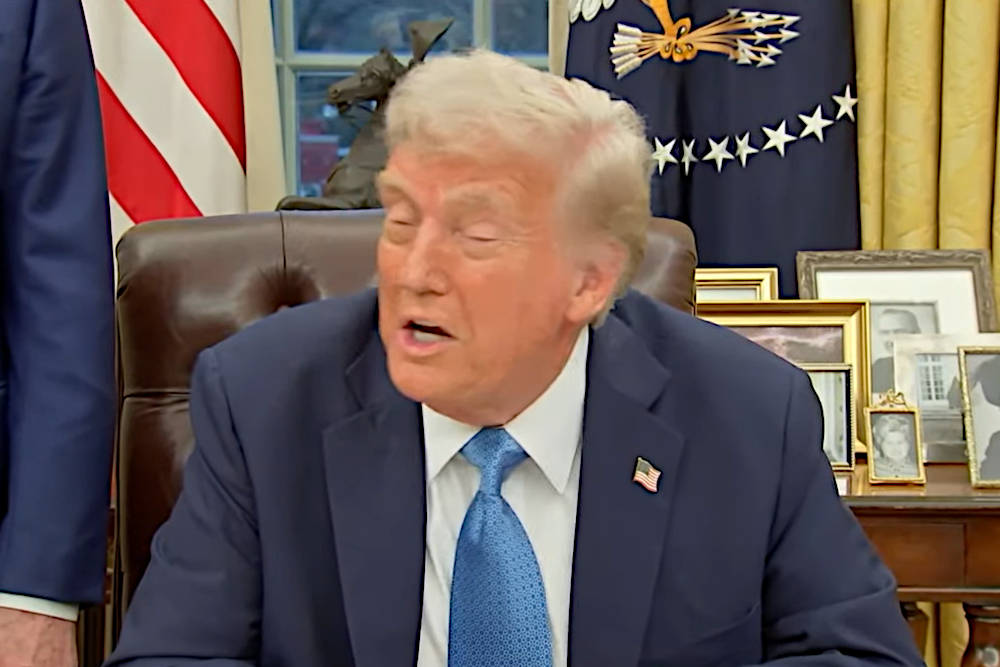
Präsident Donald Trump hat die Einführung erheblicher Zölle auf Importe aus Kanada, Mexiko und China angekündigt und damit eine deutliche Eskalation der globalen Handelsspannungen herbeigeführt. Diese Maßnahmen lösten rasche Vergeltungsmaßnahmen der betroffenen Länder aus, die weitreichende wirtschaftliche Folgen und die Sorge vor einem möglichen globalen Handelskrieg mit sich brachten.
Die Zölle und ihre Begründungen
Präsident Trump hat einen Zoll von 25 % auf alle Importe aus Kanada und Mexiko sowie einen spezifischen Zoll von 10 % auf kanadische Energieimporte eingeführt. Zusätzlich wurden 10 % Zölle auf Waren aus China erhoben. Die Regierung begründet diese Zölle mit der Notwendigkeit, Handelsungleichgewichte und nationale Sicherheitsbedenken zu bekämpfen und den Import illegaler Drogen, insbesondere Fentanyl, zu bekämpfen. Als Hauptgründe für diese Maßnahmen nannte Trump einen nationalen Notstand im Zusammenhang mit Drogenhandel und illegaler Einwanderung.
Vergeltungsmaßnahmen aus Kanada und Mexiko
Als Reaktion auf die US-Zölle hat Mexiko Vergeltungszölle zwischen 5 und 20 Prozent auf verschiedene amerikanische Waren angekündigt. Der kanadische Premierminister Justin Trudeau kündigte an, Zölle von 25 Prozent auf US-Waren im Wert von 107 Milliarden Dollar zu erheben. Diese Gegenmaßnahmen sollen die jeweiligen Volkswirtschaften schützen und den Widerstand der beiden Länder gegen die US-Zölle signalisieren.
Globale wirtschaftliche Auswirkungen
Die Ankündigung dieser Zölle hat weltweit zu deutlichen Kursrückgängen an den Aktienmärkten geführt. Die Märkte in London, Asien und Australien verzeichneten deutliche Einbrüche, was die Besorgnis der Anleger über eskalierende Handelsspannungen und mögliche Störungen der globalen Lieferketten widerspiegelt. Ökonomen warnen, dass diese Zölle zu steigenden Verbraucherpreisen, geringerem BIP-Wachstum, höherer Arbeitslosigkeit und Inflation führen könnten. Die Erwartung der Zölle hat zudem zu „Frontloading“ geführt, bei dem US-Unternehmen Waren im Voraus importieren, was zu steigenden Versandkosten führt und die globalen Lieferketten beeinträchtigt.
Internationale Reaktionen
China und die Europäische Union haben sich entschieden gegen die US-Zölle ausgesprochen. China hat bei der Welthandelsorganisation Klage gegen die USA eingereicht und behauptet, die Zölle verstießen gegen internationale Handelsregeln. Ein Sprecher der chinesischen Botschaft in Washington erklärte: „Einen Handels- oder Zollkrieg wird niemand gewinnen.“ Er betonte den gegenseitigen Nutzen der chinesisch-amerikanischen Wirtschafts- und Handelskooperation.
Auswirkungen auf das Inland
In den USA besteht die Sorge, dass diese Zölle zu höheren Preisen für Verbraucher führen könnten, insbesondere für Lebensmittel und Autos. Ökonomen argumentieren, dass die Kosten der Importzölle oft von inländischen Importeuren getragen und möglicherweise über höhere Preise an die Verbraucher weitergegeben werden. Es besteht zudem Skepsis, ob diese Zölle den beabsichtigten Aufschwung der amerikanischen Produktion bewirken oder die Probleme des Drogenhandels und der illegalen Einwanderung wirksam bekämpfen werden.
Politische Reaktionen
Der kanadische Premierminister Justin Trudeau hat Gespräche mit Präsident Trump geführt und dabei die Bedeutung der Beziehungen zwischen den USA und Kanada betont sowie die Bereitschaft zu einer konstruktiven Zusammenarbeit bekundet. Trudeau deutete jedoch auch an, dass Kanada zu Vergeltungsmaßnahmen bereit sei, um seine wirtschaftlichen Interessen zu schützen. Mexikos Präsidentin Claudia Sheinbaum warnte, eskalierende Handelsvergeltungsmaßnahmen würden die Wirtschaft beider Länder nur schädigen, und forderte bilaterale, institutionelle Mechanismen zur Bewältigung von Problemen wie Drogenhandel und illegaler Einwanderung.
Mögliche langfristige Folgen
Die Einführung dieser Zölle markiert einen bedeutenden Wandel in der US-Handelspolitik und könnte die Dynamik des Welthandels verändern. Die Abkehr von Freihandelsprinzipien hin zu Protektionismus könnte zu anhaltender wirtschaftlicher Unsicherheit und angespannten diplomatischen Beziehungen führen. Unternehmen weltweit bereiten sich bereits darauf vor, die Auswirkungen der Zölle abzumildern. Einige erwägen, trotz potenzieller Ineffizienzen und höherer Kosten, Produktionsstätten in die USA zu verlagern, um die Zölle zu umgehen.
Abschluss
Die Entscheidung von Präsident Trump, erhebliche Zölle auf Importe aus Kanada, Mexiko und China zu erheben, löste eine Kettenreaktion von Vergeltungsmaßnahmen und wirtschaftlichen Folgen aus. Die Regierung argumentiert zwar, diese Maßnahmen seien notwendig, um amerikanische Interessen zu schützen und kritische Probleme anzugehen, doch löste der Schritt weitverbreitete Besorgnis über das Potenzial eines globalen Handelskriegs und dessen Auswirkungen auf die Weltwirtschaft aus. Während sich die Situation weiterentwickelt, bereiten sich Unternehmen, Verbraucher und Regierungen weltweit auf die möglichen langfristigen Folgen dieses bedeutenden handelspolitischen Wandels vor.
War dieser Artikel hilfreich für Sie? Bitte teilen Sie uns in den Kommentaren unten mit, was Ihnen gefallen oder nicht gefallen hat.
About the Author: Alex Assoune
Wogegen Wir Kämpfen
Weltweit-Konzerne produzieren in den ärmsten Ländern im Übermaß billige Produkte.
Fabriken mit Sweatshop-ähnlichen Bedingungen, die die Arbeiter unterbezahlt.
Medienkonglomerate, die unethische, nicht nachhaltige Produkte bewerben.
Schlechte Akteure fördern durch unbewusstes Verhalten den übermäßigen Konsum.
- - - -
Zum Glück haben wir unsere Unterstützer, darunter auch Sie.
Panaprium wird von Lesern wie Ihnen finanziert, die sich unserer Mission anschließen möchten, die Welt völlig umweltfreundlich zu gestalten.
Wenn Sie können, unterstützen Sie uns bitte monatlich. Die Einrichtung dauert weniger als eine Minute und Sie werden jeden Monat einen großen Beitrag leisten. Danke schön.































0 Kommentare